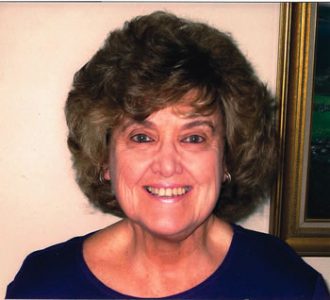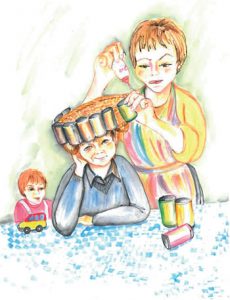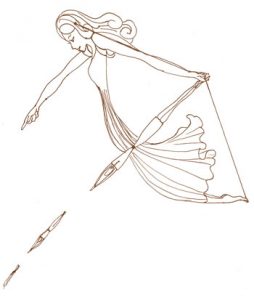Crazy Hat Day

Anne Kerrigan
Artwork by Felicity Ann Nettles
We do not see things as they are.
We see them as we are. The Talmud
It was “Crazy Hat” day at school for Sarah, my seven-year-old granddaughter. Her father, my son, who had attended the same grammar school, remarked that he had been teased unmercifully because of his “crazy hat.” He further commented, laughingly, that his hat was an upside down bread basket filled with empty cans, which had been glued to the sides of the basket, and tied under the chin with string. I have no recollection of this debacle. Whatever was I thinking? I am aware that my creativity is basically non-existent, but I sense that I could have done better than an upside down bread basket. I must have been either desperate or out of my mind.

This conversation led me to consider the many other circumstances and situations that might have occurred over the years when I was raising five children, and how various incidents might have been interpreted or even misinterpreted. Were my short-tempered episodes viewed as the tirades of an uncaring and mean mother rather than just an expression of exhaustion? Was my busyness considered inattentiveness? In reality, was I inattentive or just busy? Was my lack of presence at a teacher’s conference considered a lack of interest? Or was I unable to locate a baby-sitter? I search my memory bank, and I draw a blank. So many of the incidents blend into nothingness; they have dissolved like a snowball morphing into a puddle. I cannot seem to remember, yet my children might. As the Talmud says, we view things as we are, not necessarily as the situations actually are. My adult children might have memories that bear no resemblance to my own reminiscence (or lack thereof) of an event-like the “crazy hat” calamity.
This “disconnect” concerns me. I so desperately want their memories to be life-giving, and bring them happiness. Will they remember that I have loved them with all my being, in spite of my failings, and in spite of whatever tainted memories, real or unreal, they might have retained? Will the memory of one of those debacles arise unexpectedly to tarnish their image of the “perfect” Mom? Not that I ever felt as if I had been the perfect Mom, but I do not want to be viewed as “Mommie Dearest” either. Is there ever a good way to evaluate a “performance” as a mother? I don’t think so, but there are some guidelines which might serve as a barometer for measurement.
Did I do my best? That is an unequivocal yes, but with a caveat. A “yes” does not necessarily mean that all turned out to perfection. It does mean that I did the best I could with the tools and the knowledge available to me at that time. Actually, the whole tenor of my life was driven by my love for each of them. Was each moment guided by that love? I hope so, even if they didn’t understand it at that time. In faith, I pray that my love for them and subsequent positive actions, outweigh the slips and slides. Age and wisdom have taught me that each person is fragile and filled with imperfections. Just as I express concern about my own judgment failures, my children, as parents, will have to do the same, just as my own parents undoubtedly did, and as all parents have to do. So, I might have one vision of life’s memories, and they might have another. It seems to be the cycle of life. Denis Waitley, international motivational speaker and author, once said, “Life is the movie you see through your own unique eyes.”
 As I write this, my remaining four children are all adults (Kathleen is already in heaven). Just as the caterpillar morphs into a beautiful butterfly, my children have transitioned into wonderful, caring, responsible adults. I pray that they will understand, forgive, and even forget any “crazy hat” episodes which have impacted their lives. I am so proud of the persons they have become, and I like to hope that I exerted a positive influence on each personal journey, all the while knowing that they were the ones who travelled on that journey. They have brought immense joy to my life. In fact, I cannot even conceive of a life without their presence, and I hope they know that through the whole of life’s passage, I have loved them with every ounce of my being.
As I write this, my remaining four children are all adults (Kathleen is already in heaven). Just as the caterpillar morphs into a beautiful butterfly, my children have transitioned into wonderful, caring, responsible adults. I pray that they will understand, forgive, and even forget any “crazy hat” episodes which have impacted their lives. I am so proud of the persons they have become, and I like to hope that I exerted a positive influence on each personal journey, all the while knowing that they were the ones who travelled on that journey. They have brought immense joy to my life. In fact, I cannot even conceive of a life without their presence, and I hope they know that through the whole of life’s passage, I have loved them with every ounce of my being.
You are the bows from which your children as living arrows are sent forth.
Kahlil Gibran, 1883-1931. Lebanese poet and philosopher. The Prophet, 1923
 Entries(RSS)
Entries(RSS)